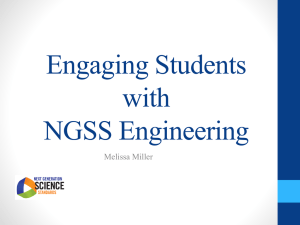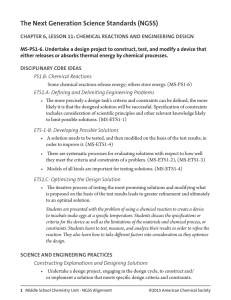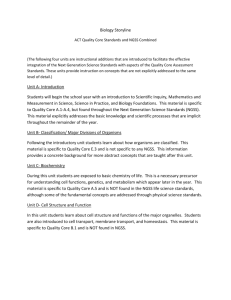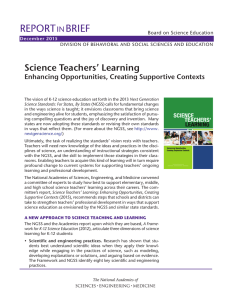California Online Mathematics Education Times (COMET)
advertisement
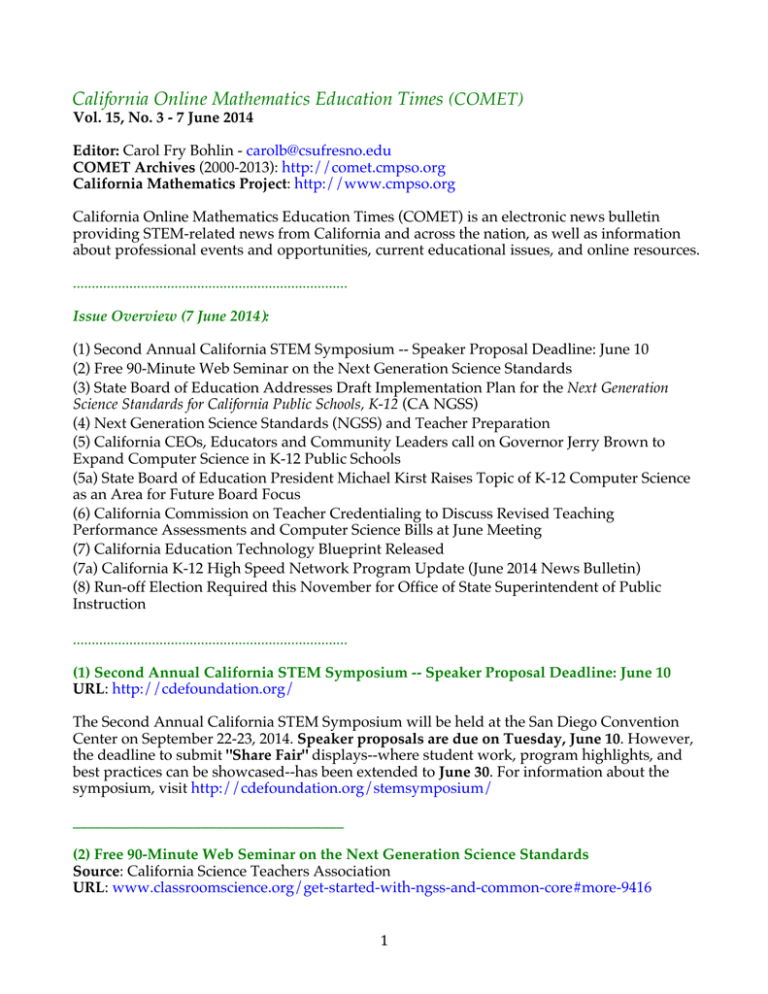
California Online Mathematics Education Times (COMET) Vol. 15, No. 3 - 7 June 2014 Editor: Carol Fry Bohlin - carolb@csufresno.edu COMET Archives (2000-2013): http://comet.cmpso.org California Mathematics Project: http://www.cmpso.org California Online Mathematics Education Times (COMET) is an electronic news bulletin providing STEM-related news from California and across the nation, as well as information about professional events and opportunities, current educational issues, and online resources. ......................................................................... Issue Overview (7 June 2014): (1) Second Annual California STEM Symposium -- Speaker Proposal Deadline: June 10 (2) Free 90-Minute Web Seminar on the Next Generation Science Standards (3) State Board of Education Addresses Draft Implementation Plan for the Next Generation Science Standards for California Public Schools, K-12 (CA NGSS) (4) Next Generation Science Standards (NGSS) and Teacher Preparation (5) California CEOs, Educators and Community Leaders call on Governor Jerry Brown to Expand Computer Science in K-12 Public Schools (5a) State Board of Education President Michael Kirst Raises Topic of K-12 Computer Science as an Area for Future Board Focus (6) California Commission on Teacher Credentialing to Discuss Revised Teaching Performance Assessments and Computer Science Bills at June Meeting (7) California Education Technology Blueprint Released (7a) California K-12 High Speed Network Program Update (June 2014 News Bulletin) (8) Run-off Election Required this November for Office of State Superintendent of Public Instruction ......................................................................... (1) Second Annual California STEM Symposium -- Speaker Proposal Deadline: June 10 URL: http://cdefoundation.org/ The Second Annual California STEM Symposium will be held at the San Diego Convention Center on September 22-23, 2014. Speaker proposals are due on Tuesday, June 10. However, the deadline to submit "Share Fair" displays--where student work, program highlights, and best practices can be showcased--has been extended to June 30. For information about the symposium, visit http://cdefoundation.org/stemsymposium/ ____________________________________ (2) Free 90-Minute Web Seminar on the Next Generation Science Standards Source: California Science Teachers Association URL: www.classroomscience.org/get-started-with-ngss-and-common-core#more-9416 1 Kathy DiRanna serves as director of the K-12 Alliance at WestEd, which is an important partner in helping to prepare California's educators for the Next Generation Science Standards (NGSS). On Tuesday, June 17, DiRanna and Cynthia Passmore, Associate Professor at UC Davis, will host a free 90-minute web seminar on the NGSS beginning at 4:30 p.m. PT. This online seminar is designed to help teachers learn how NGSS and Common Core will move students from "knowing about" to "figuring out." To register for "Shifting Instruction Through Practices: NGSS and Common Core in California Schools: Getting Started," visit http://learningcenter.nsta.org/products/symposia_seminars/NGSS/webseminar42.aspx (Note: You may have to register for the National Science Teachers Association Learning Center if you don't already have an account. Once registered, you will have access to dozens of free webinars on NGSS implementation.) ____________________________________ (3) State Board of Education Addresses Draft Implementation Plan for the Next Generation Science Standards for California Public Schools, K-12 (CA NGSS) URL: www.cde.ca.gov/be/ag/ag/yr14/agenda201405.asp URL (CDE NGSS): www.cde.ca.gov/pd/ca/sc/ngssstandards.asp Karen Shores, Administrator of the STEM Office in the Professional Learning Support Division at the California Department of Education (CDE), presented a status report of the "State Implementation Plan for the Next Generation Science Standards for California Public Schools, Grades K-12" (Item 5) at the May 7 State Board of Education (SBE) meeting. A video of her presentation, which is accompanied by a PowerPoint file (www.cde.ca.gov/be/ag/ag/yr14/documents/may14item05slides.pdf) is available at http://cde-ca.granicus.com/MediaPlayer.php?view_id=2&clip_id=135. Details of her presentation may be found in the Agenda Item 5 document: www.cde.ca.gov/be/ag/ag/yr14/documents/may14item05.doc The NGSS Strategic Leadership Team (SLT), facilitated by the K-12 Alliance/WestEd in collaboration with the CDE, has met three times this year, including once following the May SBE meeting. SLT members surveyed/interviewed numerous constituents and presented this information at the meetings. The final draft of the implementation plan will be presented to the SBE at its July meeting. Shores presented the following strategies for NGSS implementation at the SBE meeting (see Agenda Item 5 document referenced above for more details): 1. Facilitate professional learning. 2. Provide aligned instructional resources. 3. Develop aligned assessment systems. 4. Collaborate with parents, early childhood, and extended learning. 5. Collaborate with post-secondary, business, and stakeholders. 6. Disseminate supporting resources. 7. Establish communication systems. 8. Build coalitions. A proposed implementation timeline was also shared, which includes the schedule for the seven California NGSS rollout workshops, co-led by the California Department of Education, 2 California Science Project, California Science Teachers Association, K-12 Alliance/WestEd, and County Offices of Education. So far, two-day rollout workshops have been given in Stockton, Long Beach, and Yucaipa. This fall, workshops will be given in Fresno (Oct. 13-14), San Diego (Oct. 16-17), Oakland (Oct. 20-21), and Red Bluff (Oct. 23-24). For more information, visit http://tinyurl.com/ngss-rollout According to the draft timeline, science framework development meetings will be held between September 2014 and February 2015, with a draft framework being released for public review in April 2015 and anticipated adoption by January 2016. Selection of a science assessment and instructional materials will follow the framework adoption. Jessica Sawko, Executive Director of the California Science Teachers Association (CSTA), addressed the Board to express CSTA's support of the work of the SLT but also concern that many districts are not including NGSS in their LCAPs (Local Control and Accountability Plans). Board Member Trish Williams responded that the LCAP guidelines direct districts to include current academic standards in the plans, thus the NGSS should be included. She suggested that some districts might have the misconception that the NGSS are part of the Common Core, and also said that that while detailed plans are not currently expected, NGSS should not be ignored in a district's LCAP. ____________________________________ (4) Next Generation Science Standards (NGSS) and Teacher Preparation URL: www.ctc.ca.gov/commission/agendas/2014-04/2014-04-4F.pdf At the California Commission on Teacher Credentialing's meeting on April 9, CCTC consultants Katie Croy and Roxann Purdue presented Agenda Item 4F: "Overview of the Next Generation Science Standards (NGSS) for California with a Focus on Implications for Teacher Preparation." Invited speaker Kathy DiRanna (WestEd) provided an informative overview of the NGSS and the state's implementation timeline. She noted that shifts in the preparation of teachers need to take place and that questions such as the following need to be addressed: - What does it mean to teach content through the NGSS practices and cross-cutting concepts? - How is engineering incorporated into the classroom? - How do NGSS's performance expectations inform classroom assessment? Croy and Purdue noted that the Commission's tasks will include revising the SMRs (Subject Matter Requirements) for teacher preparation programs and assessments, aligning the CSET Science exams with the NGSS, revising the TPEs (Teaching Performance Expectations) and TPAs (Teaching Performance Assessments), requiring that subject matter programs submit revised program matrices, and possibly re-examining/streamlining the current science credential structure from the current nine science credentials to five (four specific subject matter areas plus the Foundational-Level General Science credential). It was noted that over 19% of the science credentials issued in 2012-13 were FLGS credentials and that this continues to be an important credential for middle grades instruction. COMET readers interested in this topic are encouraged to listen to an audio-recording of this item: www.ctc.ca.gov/audio/agendas/2014-04/2014-04-4F.mp3 DiRanna's overview of the NGSS, which begins 5 minutes into the recording, was accompanied by an informative 3 PowerPoint file available at www.ctc.ca.gov/commission/agendas/2014-04/2014-04-4FNGSS.pdf ____________________________________ (5) California CEOs, Educators, and Community Leaders Call on Governor Jerry Brown to Expand Computer Science in K-12 Public Schools URL: http://code.org/action/brown-letter On 7 May 2014, a letter was sent to Governor Jerry Brown by leaders in business, education, and the nonprofit sector encouraging him to "collaborate on a plan to expand access to computer science in K-12 public schools." The letter appears on the code.org website, which was established by leaders in the technology industry to promote coding and computer science in schools. The code.org website contains a variety of resources for teachers, including a free online K-8 "Intro to Computer Science" course (visit http://learn.code.org/ and also see http://learn.code.org/unplugged/unplug1.pdf). Excerpts from the letter appear below: Dear Governor Brown, Thank you for working tirelessly to create opportunities for California’s students. We would like to partner with you to help California become a leader in K-12 computer science education. California is home to the computing revolution that transforms our lives and provides highpaying jobs. But 90 percent of our K-12 schools do not teach computer science. The Conference Board estimates 70,000 open computing jobs in California--roughly 16 jobs for every computer science graduate in the state! Besides the jobs, a basic understanding of this foundational field is relevant in every 21st century career. Lack of access in urban and rural schools also creates inequity for students of color; in the entire state of California, only 74 African Americans and 392 Hispanic Americans took the AP Computer Science exam in 2013. Our shared goal should be that every K-12 student has access to high-quality computer science. There is unprecedented interest and action this legislative session aimed at expanding computer science in California’s K-12 system…We want your support for a broader statewide effort to increase student access. Real progress will require meaningful investment… In only 4 months, 34 million students have tried the Hour of Code, a campaign that launched on the Google homepage and in every Apple store, accompanied by speeches from President Barack Obama, US House Majority Leader Eric Cantor, Governor Jeb Bush, and US Senator Cory Booker. Almost 1.5 million people have signed Code.org's petition asking to expand computer science education... We would be grateful if you and your staff would consider meeting with a subset of us to discuss how we can work together and make California a computer science trailblazer… ……………. 4 Related article: (5a) State Board of Education President Michael Kirst Raises Topic of K-12 Computer Science as an Area for Future Board Focus URL (video): http://cde-ca.granicus.com/MediaPlayer.php?view_id=2&clip_id=135 During the discussion of the Next Generation Science Standards (NGSS) at the May 7 meeting of the State Board of Education, Board President Michael Kirst expressed concern about there being no mention of computer science in the NGSS and also referenced the letter sent to Governor Brown that day regarding the need to expand computer science in K-12 public schools (see above). Later in the meeting (Item 14--State Board Projects and Priorities), President Kirst raised the issue again: "I just want to bring up the information and sources I'm getting about the need for some kind of state policy thought and perhaps action on the area of computer science… Maybe it fits under some of our curriculum efforts, but there's a rising demand for this, and I think the Board and the Department [of Education] need to get together…and think about how we can form some sort of working group. This is a complex issue... There appears to be no consensus on exactly what ought to be in courses in high school or what the sequence ought to be. So while [computer science] is the most popular major at many universities, it seems to be an undeveloped area in K-12, so this is just a preview of things we need to work on…" ____________________________________ (6) California Commission on Teacher Credentialing to Discuss Revised Teaching Performance Assessments and Computer Science Bills at June Meeting URL: www.ctc.ca.gov/commission/agendas/2014-06/2014-06-agenda.html The June 19-20 meeting of the California Commission on Teacher Credentialing (CCTC) will include two agenda items of particular interest to STEM educators. The first, Item 2C, addresses the state's next generation of teaching performance assessments, which are mandated to determine a teacher candidate's readiness to teach and as a way to evaluate and improve teacher preparation programs. Item 2C notes "the Commission has already revised the TPEs [(Teaching Performance Expectations)] to be consistent with the CCSS [(Common Core State Standards)], and has also revised the subject matter requirements for Multiple Subjects, Single Subject English and Single Subject Mathematics to be consistent with the CCSS." The Teaching Performance Assessment (TPA) system requires all teacher candidates (i.e., students in teacher credential programs) to include current state-adopted standards in their lessons, instruction, and assessment. Accordingly, one of the 2014-15 TPA implementation policy issues is "addressing the CCSS and the NGSS [(Next Generation Science Standards)] within the TPA." For more details, visit www.ctc.ca.gov/commission/agendas/201406/2014-06-5A.pdf Also at the June meeting (Item 5A) will be an update on legislation that the Commission supports and other bills that are of interest. In the latter category are a number of computer science bills that the California STEM Learning Network (CSLNet) is also following, most of which are moving steadily through the approval process with strong support: 5 SB 1200 -- Public postsecondary education: academic standards: computer science Summary: This bill would require the Trustees of the California State University (CSU) and would request the Regents of the University of California (UC) to develop guidelines for high school computer science courses to be approved for purposes of recognition for admission to [CSU and UC], respectively, and would encourage [UC] to ensure that computer science courses that satisfy the mathematics subject area requirements for admission build upon fundamental mathematics content provided in courses that align with [the CCSS]. AB 1539 -- Content standards: computer science Summary: This bill would encourage the Instructional Quality Commission to develop and recommend to the State Board of Education, computer science content standards pursuant to recommendations developed by a group of computer science experts, on or before July 31, 2016... AB 1764 -- School curriculum: mathematics: computer science Summary: …This bill would authorize the governing board of a school district that requires more than 2 courses in mathematics for graduation to award a pupil up to one mathematics course credit for successfully completing an approved computer science course, as provided [as long as the course isn't also used to satisfy the graduation requirement in science]. AB 2110 -- Pupil instruction: computer science Summary: ... This bill would require the commission to consider incorporating computer science curriculum content into the mathematics, science, history‐social science, and language arts curriculum frameworks, as it deems appropriate, when those frameworks are next revised. In addition to the computer science bills above, CSLNet is also following these two related bills: AB 1530 -- Model curricula: computer science Summary: It is the intent of the Legislature to encourage the establishment of programs of instruction in computer science, with instruction beginning as early as feasible for each school district. AB 1540 -- Concurrent enrollment in secondary school and community college Summary: This bill would allow high school students to earn computer science credit through a local community college. ____________________________________ (7) California Education Technology Blueprint Released Source: California Department of Education URL: www.cde.ca.gov/eo/in/edtechbi.asp In March 2012, State Superintendent of Public Instruction Tom Torlakson convened a 48member Education Technology Task Force to recommend ways to bring 21st century tools into K-12 classrooms to improve teaching and learning. The Superintendent charged the group to review current research provided by the National Education Technology Plan: Transforming American Education: Learning Powered by Technology (see 6 www.ed.gov/technology/netp-2010) and to use that model and conceptual framework to develop a long-range education technology plan for the state's schools. Upon completion of this process on 16 August 2012, the Task Force delivered to Superintendent Torlakson a memorandum outlining its recommendations, after which Torlakson and his staff made presentations around the state and gathered comments from the public. He and his staff reviewed other documents, and in April 2014, the final report was released. Empowering Learning: California Education Technology Blueprint, 2014-2017 (Ed Tech Blueprint) is available online at www.cde.ca.gov/eo/in/documents/yr14bp0418.pdf The report focuses on four key areas: learning, teaching, assessment, and infrastructure. Recommendations include the following: - California should work toward providing every student, teacher, and administrator with access to at least one Internet-connected device. - Create professional development and teacher certification programs in education technology instruction. - Establish professional development programs and platforms for using technology in formative learning assessment. - Ensure school districts design school facilities with technology and the Common Core State Standards in mind. A list of all 19 recommendations is included on pp. 12-13 of the report. "As California continues to move toward college and career readiness for every child, education technology has to be part of what we do," Torlakson said. "I've visited classrooms up and down the state and seen everything from virtual science experiments to online group projects. From Common Core to the new Smarter Balanced assessments, our state--which has always led the way in innovation--is focused on preparing students with the real-world skills they need. This new blueprint charts a smart course for getting us there." …………………………….. Related Report: (7a) California K-12 High Speed Network Program Update (June 2014 News Bulletin) URL: www.k12hsn.org/files/publications/Updates/K12HSN_Program_Update_June_2014.pdf ____________________________________ (8) Run-off Election Required this November for Office of State Superintendent of Public Instruction URL: http://vote.sos.ca.gov/returns/superintendent-of-public-instruction/ In Tuesday's (6/3/2014) California statewide primary election, three candidates vied for the office of State Superintendent of Public Instruction: incumbent Tom Torlakson, who garnered 46.9% of the vote; Marshall Tuck (28.7%); and Lydia Gutierrez (24.4%). Because Torlakson did not receive a majority of the votes cast, a runoff will be held this November against Tuck. The positions of these two candidates can be found on their websites: www.tomtorlakson.com and www.marshalltuck.com 7 ......................................................................... COMET is supported by a grant from the California Mathematics Project. ......................................................................... ~ To unsubscribe from COMET, send the following message to listserv@listserv.csufresno.edu: Unsubscribe COMET ~ To subscribe to COMET, send the following message to listserv@listserv.csufresno.edu: Subscribe COMET [followed by your name] Example: Subscribe COMET Albert Einstein ......................................................................... Carol Fry Bohlin, Ph.D. Professor and Special Assistant to the Provost for STEM Initiatives Director, Mathematics and Science Teacher Initiative (MSTI) Editor, California Online Mathematics Education Times (COMET) California State University, Fresno 5005 N. Maple Ave. M/S ED 2 Fresno, CA 93740-8025 E-mail: carolb@csufresno.edu COMET: http://comet.cmpso.org/ 8

